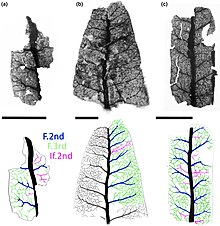Furcula is a genus of extinct plant from Late Triassic Greenland. It contains one species, F. granulifer. The leaves of Furcula have complex net-like veins like those of angiosperms (flowering plants); because of this, it was long considered a possible stem-group angiosperm. However, a recent reinvestigation suggests it is a peltasperm (a type of "seed fern") that convergently evolved angiosperm-like veins.[2][3]
| Furcula granulifer Temporal range: Late Triassic (Rhaetian),
| |
|---|---|

| |
| Venation plus diagrams interpreting the venation of Furcula | |
| Scientific classification | |
| Kingdom: | Plantae |
| Clade: | Tracheophytes |
| Order: | †Peltaspermales |
| Genus: | †Furcula Harris, 1932[1] |
| Species: | †F. granulifer
|
| Binomial name | |
| †Furcula granulifer Harris, 1932
| |

References
edit- ^ Harris, T.M. (1932). The Fossil Flora of Scoresby Sound, East Greenland: Part 2: Description of seed plants incertae sedis together with a discussion of certain cycadophyte cuticles. pp. 4–7.
- ^ Coiro, Mario; McLoughlin, Stephen; Steinthorsdottir, Margret; Vajda, Vivi; Fabrikant, Dolev; Seyfullah, Leyla J. (2024-04-16). "Parallel evolution of angiosperm-like venation in Peltaspermales: a reinvestigation of Furcula". New Phytologist. 242 (6): 2845–2856. doi:10.1111/nph.19726. ISSN 0028-646X. PMID 38623034.
- ^ "Seed ferns: Plants experimented with complex leaf vein networks 201 million years ago". ScienceDaily. Retrieved 2024-04-19.